 The number one complaint patients have when they go to their primary doctor is a lack of energy. It used to be that this was the primary complaint of old people, but over the last several decades this has been a primary concern for younger and younger people. Now we hear this as a chronic complaint in folks who have just entered their forties. It happens at much younger ages as well, but not usually as the primary complaint. What is going on here? Why is everybody so tired? Physically, life has gotten easier for most people as our culture has moved away from a more rural lifestyle to city life. Most of us do not have to get up at four in the morning to milk the cows and feed the chickens anymore. We aren’t doing backbreaking work in the fields or the factories anymore either. These days work looks more like sitting in front of a computer, and since the pandemic, we are doing that at home now.
The number one complaint patients have when they go to their primary doctor is a lack of energy. It used to be that this was the primary complaint of old people, but over the last several decades this has been a primary concern for younger and younger people. Now we hear this as a chronic complaint in folks who have just entered their forties. It happens at much younger ages as well, but not usually as the primary complaint. What is going on here? Why is everybody so tired? Physically, life has gotten easier for most people as our culture has moved away from a more rural lifestyle to city life. Most of us do not have to get up at four in the morning to milk the cows and feed the chickens anymore. We aren’t doing backbreaking work in the fields or the factories anymore either. These days work looks more like sitting in front of a computer, and since the pandemic, we are doing that at home now.
 Nevertheless, so many people just don’t have the energy to fully engage and enjoy life. Everyone points to stress as the big thief of our energy, but how is our modern life any more stressful than say during WWII? Why wasn’t everyone tired during the great depression? By any measure, these were much more stressful times than modern life today. Every era has its social problems, political conflicts, and money issues. There has always been lots of poverty and just a few really rich folks. When I was discussing the topic of stress with Ellen, she came up with the idea that stress and fear go hand in hand. Everyone has always had fear, but in past times we had clear things to blame our fear on. These days the fear is there, but it seems to be a free-floating fear of the unknown. We keep trying to pin it down to one cause or another, but it does not stick. We are overstimulated with potential things to fear that we have zero power over, and every newscast comes up with something new to be afraid of. Is stress the cause, or is it just a convenient excuse? Maybe our stress comes from not having the energy to meet the challenges of daily life. Older generations seemed to have more stamina than we do today.
Nevertheless, so many people just don’t have the energy to fully engage and enjoy life. Everyone points to stress as the big thief of our energy, but how is our modern life any more stressful than say during WWII? Why wasn’t everyone tired during the great depression? By any measure, these were much more stressful times than modern life today. Every era has its social problems, political conflicts, and money issues. There has always been lots of poverty and just a few really rich folks. When I was discussing the topic of stress with Ellen, she came up with the idea that stress and fear go hand in hand. Everyone has always had fear, but in past times we had clear things to blame our fear on. These days the fear is there, but it seems to be a free-floating fear of the unknown. We keep trying to pin it down to one cause or another, but it does not stick. We are overstimulated with potential things to fear that we have zero power over, and every newscast comes up with something new to be afraid of. Is stress the cause, or is it just a convenient excuse? Maybe our stress comes from not having the energy to meet the challenges of daily life. Older generations seemed to have more stamina than we do today.
 One of the new hot topics for research is longevity research. The search for the fountain of youth is in full swing once again. Boomers are getting old, and they don’t like it. Energy is a central theme in this research. Many of the big researchers in this field are saying that aging is just a problem of insufficient energy. When we are young, we have lots of energy to not only run around doing all the stuff we want to do but to also repair any damaged tissue and replace worn-out tissues. The replacement and repair process is what keeps us young. As we age, our ability to generate the energy we need gets less and less. If we don’t have the energy to eat up old damaged cells and replace them with vibrant new ones, we have a problem. Those old cells (called senescent cells) produce poisons that make us feel old. These poisons create inflammation that decreases our ability to function. They also make us hurt.
One of the new hot topics for research is longevity research. The search for the fountain of youth is in full swing once again. Boomers are getting old, and they don’t like it. Energy is a central theme in this research. Many of the big researchers in this field are saying that aging is just a problem of insufficient energy. When we are young, we have lots of energy to not only run around doing all the stuff we want to do but to also repair any damaged tissue and replace worn-out tissues. The replacement and repair process is what keeps us young. As we age, our ability to generate the energy we need gets less and less. If we don’t have the energy to eat up old damaged cells and replace them with vibrant new ones, we have a problem. Those old cells (called senescent cells) produce poisons that make us feel old. These poisons create inflammation that decreases our ability to function. They also make us hurt.
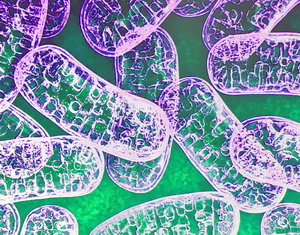 Why do we lose the ability to make all the energy we need? The core of our energy-making processes in the body are the tiny energy factories called mitochondria. Every cell we have (except blood cells) should have 1000 to 2500 mitochondria in it pumping out the energy molecule ATP. ATP is the gas that our biological systems run on. The average cell uses 10 billion ATP per day. If we don’t have enough ATP inside each cell, the cells are not able to manufacture proteins to repair themselves with. They can’t bundle up poisons and garbage that cellular living processes create and dump them outside the cell for the body to carry away and eliminate. Our cells start dying inside choking on their waste. Hundreds of processes inside cells require this ATP to do their jobs. If there is not enough ATP to go around, our cells get old and cranky.
Why do we lose the ability to make all the energy we need? The core of our energy-making processes in the body are the tiny energy factories called mitochondria. Every cell we have (except blood cells) should have 1000 to 2500 mitochondria in it pumping out the energy molecule ATP. ATP is the gas that our biological systems run on. The average cell uses 10 billion ATP per day. If we don’t have enough ATP inside each cell, the cells are not able to manufacture proteins to repair themselves with. They can’t bundle up poisons and garbage that cellular living processes create and dump them outside the cell for the body to carry away and eliminate. Our cells start dying inside choking on their waste. Hundreds of processes inside cells require this ATP to do their jobs. If there is not enough ATP to go around, our cells get old and cranky.
 So what is going wrong with our mitochondria? Why are they not producing enough ATP to fuel our bodies? This is not a hypothetical concern. When researchers examine the mitochondria in middle-aged people and older people, they see all sorts of damage to the little energy factories. They get deformed. Their numbers are less than they should be, meaning they are not being produced properly. Chemically they are not working correctly. Parts of the energy factory line are stuck and have stopped working altogether. Mitochondria need to be working constantly every minute of every day. We can’t store ATP. Every ATP has to be recycled in the mitochondria 1000 times each day. We have sick mitochondria, and that is shortening our energy supply which in turn is causing us to age more quickly. What does this feel like personally? We are tired. We get achy and sore way too easily. We don’t sleep as well. We get sick more easily and it takes longer to recover from things. I hear it every day – “I feel like an old person.”
So what is going wrong with our mitochondria? Why are they not producing enough ATP to fuel our bodies? This is not a hypothetical concern. When researchers examine the mitochondria in middle-aged people and older people, they see all sorts of damage to the little energy factories. They get deformed. Their numbers are less than they should be, meaning they are not being produced properly. Chemically they are not working correctly. Parts of the energy factory line are stuck and have stopped working altogether. Mitochondria need to be working constantly every minute of every day. We can’t store ATP. Every ATP has to be recycled in the mitochondria 1000 times each day. We have sick mitochondria, and that is shortening our energy supply which in turn is causing us to age more quickly. What does this feel like personally? We are tired. We get achy and sore way too easily. We don’t sleep as well. We get sick more easily and it takes longer to recover from things. I hear it every day – “I feel like an old person.”
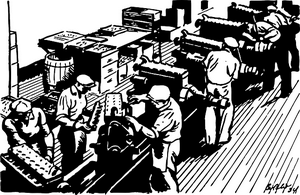 Okay, so what damages our mitochondria? Just the process of making energy produces oxidative stress inside the mitochondria which causes damage if the right protective nutrients (like CoQ10 and glutathione) are low. Other nutrients like carnitine are essential to carry fatty acids to be broken down to form ATP. The B vitamins are essential along with iron, magnesium, and manganese. Then there are the many substances that damage mitochondria directly like common drugs such as painkillers (NSAIDs), statins, antibiotics, meth, cocaine, mood/psych drugs, and many others. Toxic metals damage mitochondria – mercury, arsenic, lead, etc. All sorts of organic pollutants like pesticides destroy mitochondria. Alcohol damages mitochondria. Viruses and parasitic bacteria can destroy mitochondrial functioning. A major cause recently discovered that damages mitochondria are lipopolysaccharides produced by negative gut bacteria that get into the bloodstream through a leaky gut issue. Then there are the food chemicals that are so prevalent in processed foods. Of particular interest is the damage caused by linoleic acid found in vegetable oils.
Okay, so what damages our mitochondria? Just the process of making energy produces oxidative stress inside the mitochondria which causes damage if the right protective nutrients (like CoQ10 and glutathione) are low. Other nutrients like carnitine are essential to carry fatty acids to be broken down to form ATP. The B vitamins are essential along with iron, magnesium, and manganese. Then there are the many substances that damage mitochondria directly like common drugs such as painkillers (NSAIDs), statins, antibiotics, meth, cocaine, mood/psych drugs, and many others. Toxic metals damage mitochondria – mercury, arsenic, lead, etc. All sorts of organic pollutants like pesticides destroy mitochondria. Alcohol damages mitochondria. Viruses and parasitic bacteria can destroy mitochondrial functioning. A major cause recently discovered that damages mitochondria are lipopolysaccharides produced by negative gut bacteria that get into the bloodstream through a leaky gut issue. Then there are the food chemicals that are so prevalent in processed foods. Of particular interest is the damage caused by linoleic acid found in vegetable oils.
 As you can see, many of the sources of damage to our energy production system come from things we have created over the last hundred years. The huge shifts in our diet, the addition of various drugs into our daily lives, how we process our foods, and the damage to our gut have resulted from these dietary changes. Some of this damage is due to cumulative damage to the DNA in the mitochondria and some damage to the structure and functioning. We begin to see why our ancestors had more stamina than us. We have been messing up our energy system for the last 100 years.
As you can see, many of the sources of damage to our energy production system come from things we have created over the last hundred years. The huge shifts in our diet, the addition of various drugs into our daily lives, how we process our foods, and the damage to our gut have resulted from these dietary changes. Some of this damage is due to cumulative damage to the DNA in the mitochondria and some damage to the structure and functioning. We begin to see why our ancestors had more stamina than us. We have been messing up our energy system for the last 100 years.
 So what can we do? I see a two-pronged approach on an immediate level. We can stop putting things into our bodies that damage mitochondria and we can feed them the right nutrients they need to function well. A bonus level might be achieved by finding and using novel substances that can support mitochondrial functioning. This last step is what the researchers into longevity are focused on. They want the miracle pill that will fix us up and bring us our energy back; the new fountain of youth. They are making some strides, but it will be a long process because they want something patentable so they can make a fortune. Natural molecules that already exist that can help us are not in their interest as there is no money to be made in them.
So what can we do? I see a two-pronged approach on an immediate level. We can stop putting things into our bodies that damage mitochondria and we can feed them the right nutrients they need to function well. A bonus level might be achieved by finding and using novel substances that can support mitochondrial functioning. This last step is what the researchers into longevity are focused on. They want the miracle pill that will fix us up and bring us our energy back; the new fountain of youth. They are making some strides, but it will be a long process because they want something patentable so they can make a fortune. Natural molecules that already exist that can help us are not in their interest as there is no money to be made in them.
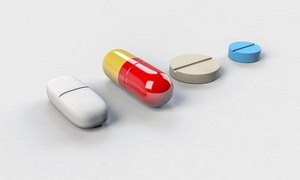 For myself, I am using several nutrients that help the mitochondria function properly. One I wrote about a few weeks ago — methylene blue. I am also taking ALCAR which is a more absorbable form of the carnitine as well as a good shot of the B vitamins, CoQ10, and PQQ. Additionally, I am supplementing a key molecule the mitochondria use to make ATP called NMN – Nicotinamide Mononucleotide. I am taking NAC plus glycine to increase my glutathione levels to fight the oxidative stress in the mitochondria. Some research also suggests that higher levels of CO2 are also good for this, so I drink carbonated spring water to support this. Some research has shown the benefits of red light therapy on mitochondrial functioning as well as hydrogen therapy, so I use these as well. I have avoided vegetable oils for the last 20 years, and avoid processed foods as much as possible. I stay away from plastic chemicals and any use of drugs, medications, and alcohol. There is a lot of stuff we can do, and all of it will help our energy levels which will help us keep aging at bay.
For myself, I am using several nutrients that help the mitochondria function properly. One I wrote about a few weeks ago — methylene blue. I am also taking ALCAR which is a more absorbable form of the carnitine as well as a good shot of the B vitamins, CoQ10, and PQQ. Additionally, I am supplementing a key molecule the mitochondria use to make ATP called NMN – Nicotinamide Mononucleotide. I am taking NAC plus glycine to increase my glutathione levels to fight the oxidative stress in the mitochondria. Some research also suggests that higher levels of CO2 are also good for this, so I drink carbonated spring water to support this. Some research has shown the benefits of red light therapy on mitochondrial functioning as well as hydrogen therapy, so I use these as well. I have avoided vegetable oils for the last 20 years, and avoid processed foods as much as possible. I stay away from plastic chemicals and any use of drugs, medications, and alcohol. There is a lot of stuff we can do, and all of it will help our energy levels which will help us keep aging at bay.
Take care,
David
Ellen 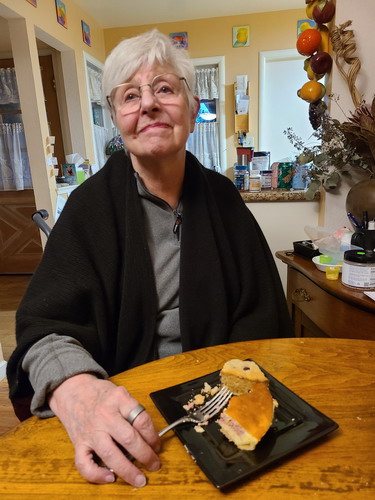
Ellen has decided she has a new favorite food, pie. Not just any pie, but cottage cheese custard pie. I sort of created it out of stuff I had in the fridge plus a gluten free pie crust I bought at the supermarket. While it has the look, feel, and taste of a lovely dessert, it is almost all protein and no sugar. For sweetening I use monk fruit sweetener with erythritol. This way she can feel like she is indulging herself without paying the price.
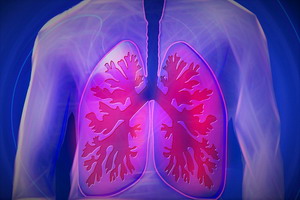 COPD helped by gut bacteria transplant
COPD helped by gut bacteria transplant
 Cannabis for drug addiction?
Cannabis for drug addiction?
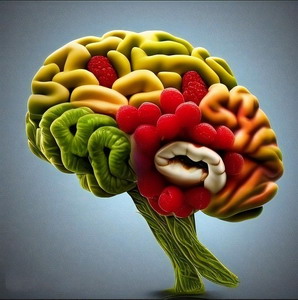 Long covid – infection or inflammation?
Long covid – infection or inflammation?

 The number one complaint patients have when they go to their primary doctor is a lack of energy. It used to be that this was the primary complaint of old people, but over the last several decades this has been a primary concern for younger and younger people. Now we hear this as a chronic complaint in folks who have just entered their forties. It happens at much younger ages as well, but not usually as the primary complaint. What is going on here? Why is everybody so tired? Physically, life has gotten easier for most people as our culture has moved away from a more rural lifestyle to city life. Most of us do not have to get up at four in the morning to milk the cows and feed the chickens anymore. We aren’t doing backbreaking work in the fields or the factories anymore either. These days work looks more like sitting in front of a computer, and since the pandemic, we are doing that at home now.
The number one complaint patients have when they go to their primary doctor is a lack of energy. It used to be that this was the primary complaint of old people, but over the last several decades this has been a primary concern for younger and younger people. Now we hear this as a chronic complaint in folks who have just entered their forties. It happens at much younger ages as well, but not usually as the primary complaint. What is going on here? Why is everybody so tired? Physically, life has gotten easier for most people as our culture has moved away from a more rural lifestyle to city life. Most of us do not have to get up at four in the morning to milk the cows and feed the chickens anymore. We aren’t doing backbreaking work in the fields or the factories anymore either. These days work looks more like sitting in front of a computer, and since the pandemic, we are doing that at home now. Nevertheless, so many people just don’t have the energy to fully engage and enjoy life. Everyone points to stress as the big thief of our energy, but how is our modern life any more stressful than say during WWII? Why wasn’t everyone tired during the great depression? By any measure, these were much more stressful times than modern life today. Every era has its social problems, political conflicts, and money issues. There has always been lots of poverty and just a few really rich folks. When I was discussing the topic of stress with Ellen, she came up with the idea that stress and fear go hand in hand. Everyone has always had fear, but in past times we had clear things to blame our fear on. These days the fear is there, but it seems to be a free-floating fear of the unknown. We keep trying to pin it down to one cause or another, but it does not stick. We are overstimulated with potential things to fear that we have zero power over, and every newscast comes up with something new to be afraid of. Is stress the cause, or is it just a convenient excuse? Maybe our stress comes from not having the energy to meet the challenges of daily life. Older generations seemed to have more stamina than we do today.
Nevertheless, so many people just don’t have the energy to fully engage and enjoy life. Everyone points to stress as the big thief of our energy, but how is our modern life any more stressful than say during WWII? Why wasn’t everyone tired during the great depression? By any measure, these were much more stressful times than modern life today. Every era has its social problems, political conflicts, and money issues. There has always been lots of poverty and just a few really rich folks. When I was discussing the topic of stress with Ellen, she came up with the idea that stress and fear go hand in hand. Everyone has always had fear, but in past times we had clear things to blame our fear on. These days the fear is there, but it seems to be a free-floating fear of the unknown. We keep trying to pin it down to one cause or another, but it does not stick. We are overstimulated with potential things to fear that we have zero power over, and every newscast comes up with something new to be afraid of. Is stress the cause, or is it just a convenient excuse? Maybe our stress comes from not having the energy to meet the challenges of daily life. Older generations seemed to have more stamina than we do today. One of the new hot topics for research is longevity research. The search for the fountain of youth is in full swing once again. Boomers are getting old, and they don’t like it. Energy is a central theme in this research. Many of the big researchers in this field are saying that aging is just a problem of insufficient energy. When we are young, we have lots of energy to not only run around doing all the stuff we want to do but to also repair any damaged tissue and replace worn-out tissues. The replacement and repair process is what keeps us young. As we age, our ability to generate the energy we need gets less and less. If we don’t have the energy to eat up old damaged cells and replace them with vibrant new ones, we have a problem. Those old cells (called senescent cells) produce poisons that make us feel old. These poisons create inflammation that decreases our ability to function. They also make us hurt.
One of the new hot topics for research is longevity research. The search for the fountain of youth is in full swing once again. Boomers are getting old, and they don’t like it. Energy is a central theme in this research. Many of the big researchers in this field are saying that aging is just a problem of insufficient energy. When we are young, we have lots of energy to not only run around doing all the stuff we want to do but to also repair any damaged tissue and replace worn-out tissues. The replacement and repair process is what keeps us young. As we age, our ability to generate the energy we need gets less and less. If we don’t have the energy to eat up old damaged cells and replace them with vibrant new ones, we have a problem. Those old cells (called senescent cells) produce poisons that make us feel old. These poisons create inflammation that decreases our ability to function. They also make us hurt. Why do we lose the ability to make all the energy we need? The core of our energy-making processes in the body are the tiny energy factories called mitochondria. Every cell we have (except blood cells) should have 1000 to 2500 mitochondria in it pumping out the energy molecule ATP. ATP is the gas that our biological systems run on. The average cell uses 10 billion ATP per day. If we don’t have enough ATP inside each cell, the cells are not able to manufacture proteins to repair themselves with. They can’t bundle up poisons and garbage that cellular living processes create and dump them outside the cell for the body to carry away and eliminate. Our cells start dying inside choking on their waste. Hundreds of processes inside cells require this ATP to do their jobs. If there is not enough ATP to go around, our cells get old and cranky.
Why do we lose the ability to make all the energy we need? The core of our energy-making processes in the body are the tiny energy factories called mitochondria. Every cell we have (except blood cells) should have 1000 to 2500 mitochondria in it pumping out the energy molecule ATP. ATP is the gas that our biological systems run on. The average cell uses 10 billion ATP per day. If we don’t have enough ATP inside each cell, the cells are not able to manufacture proteins to repair themselves with. They can’t bundle up poisons and garbage that cellular living processes create and dump them outside the cell for the body to carry away and eliminate. Our cells start dying inside choking on their waste. Hundreds of processes inside cells require this ATP to do their jobs. If there is not enough ATP to go around, our cells get old and cranky. So what is going wrong with our mitochondria? Why are they not producing enough ATP to fuel our bodies? This is not a hypothetical concern. When researchers examine the mitochondria in middle-aged people and older people, they see all sorts of damage to the little energy factories. They get deformed. Their numbers are less than they should be, meaning they are not being produced properly. Chemically they are not working correctly. Parts of the energy factory line are stuck and have stopped working altogether. Mitochondria need to be working constantly every minute of every day. We can’t store ATP. Every ATP has to be recycled in the mitochondria 1000 times each day. We have sick mitochondria, and that is shortening our energy supply which in turn is causing us to age more quickly. What does this feel like personally? We are tired. We get achy and sore way too easily. We don’t sleep as well. We get sick more easily and it takes longer to recover from things. I hear it every day – “I feel like an old person.”
So what is going wrong with our mitochondria? Why are they not producing enough ATP to fuel our bodies? This is not a hypothetical concern. When researchers examine the mitochondria in middle-aged people and older people, they see all sorts of damage to the little energy factories. They get deformed. Their numbers are less than they should be, meaning they are not being produced properly. Chemically they are not working correctly. Parts of the energy factory line are stuck and have stopped working altogether. Mitochondria need to be working constantly every minute of every day. We can’t store ATP. Every ATP has to be recycled in the mitochondria 1000 times each day. We have sick mitochondria, and that is shortening our energy supply which in turn is causing us to age more quickly. What does this feel like personally? We are tired. We get achy and sore way too easily. We don’t sleep as well. We get sick more easily and it takes longer to recover from things. I hear it every day – “I feel like an old person.” Okay, so what damages our mitochondria? Just the process of making energy produces oxidative stress inside the mitochondria which causes damage if the right protective nutrients (like CoQ10 and glutathione) are low. Other nutrients like carnitine are essential to carry fatty acids to be broken down to form ATP. The B vitamins are essential along with iron, magnesium, and manganese. Then there are the many substances that damage mitochondria directly like common drugs such as painkillers (NSAIDs), statins, antibiotics, meth, cocaine, mood/psych drugs, and many others. Toxic metals damage mitochondria – mercury, arsenic, lead, etc. All sorts of organic pollutants like pesticides destroy mitochondria. Alcohol damages mitochondria. Viruses and parasitic bacteria can destroy mitochondrial functioning. A major cause recently discovered that damages mitochondria are lipopolysaccharides produced by negative gut bacteria that get into the bloodstream through a leaky gut issue. Then there are the food chemicals that are so prevalent in processed foods. Of particular interest is the damage caused by linoleic acid found in vegetable oils.
Okay, so what damages our mitochondria? Just the process of making energy produces oxidative stress inside the mitochondria which causes damage if the right protective nutrients (like CoQ10 and glutathione) are low. Other nutrients like carnitine are essential to carry fatty acids to be broken down to form ATP. The B vitamins are essential along with iron, magnesium, and manganese. Then there are the many substances that damage mitochondria directly like common drugs such as painkillers (NSAIDs), statins, antibiotics, meth, cocaine, mood/psych drugs, and many others. Toxic metals damage mitochondria – mercury, arsenic, lead, etc. All sorts of organic pollutants like pesticides destroy mitochondria. Alcohol damages mitochondria. Viruses and parasitic bacteria can destroy mitochondrial functioning. A major cause recently discovered that damages mitochondria are lipopolysaccharides produced by negative gut bacteria that get into the bloodstream through a leaky gut issue. Then there are the food chemicals that are so prevalent in processed foods. Of particular interest is the damage caused by linoleic acid found in vegetable oils. As you can see, many of the sources of damage to our energy production system come from things we have created over the last hundred years. The huge shifts in our diet, the addition of various drugs into our daily lives, how we process our foods, and the damage to our gut have resulted from these dietary changes. Some of this damage is due to cumulative damage to the DNA in the mitochondria and some damage to the structure and functioning. We begin to see why our ancestors had more stamina than us. We have been messing up our energy system for the last 100 years.
As you can see, many of the sources of damage to our energy production system come from things we have created over the last hundred years. The huge shifts in our diet, the addition of various drugs into our daily lives, how we process our foods, and the damage to our gut have resulted from these dietary changes. Some of this damage is due to cumulative damage to the DNA in the mitochondria and some damage to the structure and functioning. We begin to see why our ancestors had more stamina than us. We have been messing up our energy system for the last 100 years. So what can we do? I see a two-pronged approach on an immediate level. We can stop putting things into our bodies that damage mitochondria and we can feed them the right nutrients they need to function well. A bonus level might be achieved by finding and using novel substances that can support mitochondrial functioning. This last step is what the researchers into longevity are focused on. They want the miracle pill that will fix us up and bring us our energy back; the new fountain of youth. They are making some strides, but it will be a long process because they want something patentable so they can make a fortune. Natural molecules that already exist that can help us are not in their interest as there is no money to be made in them.
So what can we do? I see a two-pronged approach on an immediate level. We can stop putting things into our bodies that damage mitochondria and we can feed them the right nutrients they need to function well. A bonus level might be achieved by finding and using novel substances that can support mitochondrial functioning. This last step is what the researchers into longevity are focused on. They want the miracle pill that will fix us up and bring us our energy back; the new fountain of youth. They are making some strides, but it will be a long process because they want something patentable so they can make a fortune. Natural molecules that already exist that can help us are not in their interest as there is no money to be made in them. For myself, I am using several nutrients that help the mitochondria function properly. One I wrote about a few weeks ago — methylene blue. I am also taking ALCAR which is a more absorbable form of the carnitine as well as a good shot of the B vitamins, CoQ10, and PQQ. Additionally, I am supplementing a key molecule the mitochondria use to make ATP called NMN – Nicotinamide Mononucleotide. I am taking NAC plus glycine to increase my glutathione levels to fight the oxidative stress in the mitochondria. Some research also suggests that higher levels of CO2 are also good for this, so I drink carbonated spring water to support this. Some research has shown the benefits of red light therapy on mitochondrial functioning as well as hydrogen therapy, so I use these as well. I have avoided vegetable oils for the last 20 years, and avoid processed foods as much as possible. I stay away from plastic chemicals and any use of drugs, medications, and alcohol. There is a lot of stuff we can do, and all of it will help our energy levels which will help us keep aging at bay.
For myself, I am using several nutrients that help the mitochondria function properly. One I wrote about a few weeks ago — methylene blue. I am also taking ALCAR which is a more absorbable form of the carnitine as well as a good shot of the B vitamins, CoQ10, and PQQ. Additionally, I am supplementing a key molecule the mitochondria use to make ATP called NMN – Nicotinamide Mononucleotide. I am taking NAC plus glycine to increase my glutathione levels to fight the oxidative stress in the mitochondria. Some research also suggests that higher levels of CO2 are also good for this, so I drink carbonated spring water to support this. Some research has shown the benefits of red light therapy on mitochondrial functioning as well as hydrogen therapy, so I use these as well. I have avoided vegetable oils for the last 20 years, and avoid processed foods as much as possible. I stay away from plastic chemicals and any use of drugs, medications, and alcohol. There is a lot of stuff we can do, and all of it will help our energy levels which will help us keep aging at bay.